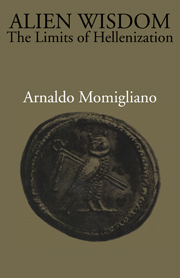Book contents
- Frontmatter
- Contents
- Per mia madre, presente sempre nel suo vigilc amore
- Preface
- 1 The Greeks and their neighbours in the Hellenistic world
- 2 Polybius and Posidonius
- 3 The Celts and the Greeks
- 4 The Hellenistic discovery of Judaism
- 5 Greeks, Jews and Romans from Antiochus III to Pompey
- 6 Iranians and Greeks
- Select Bibliography
- Index of Names
4 - The Hellenistic discovery of Judaism
Published online by Cambridge University Press: 01 June 2011
- Frontmatter
- Contents
- Per mia madre, presente sempre nel suo vigilc amore
- Preface
- 1 The Greeks and their neighbours in the Hellenistic world
- 2 Polybius and Posidonius
- 3 The Celts and the Greeks
- 4 The Hellenistic discovery of Judaism
- 5 Greeks, Jews and Romans from Antiochus III to Pompey
- 6 Iranians and Greeks
- Select Bibliography
- Index of Names
Summary
The Greeks were perhaps the first to study the peculiarities of foreigners. They began by collecting information as traders or colonists but by the end of the sixth century b.c. they were already writing books on ethnography and geography to satisfy their taste for enquiry – for historia, as they called it. As Herodotus shows, their enquiries extended to territories no Greek had ever visited (4.25). On the other hand we have noticed that the Greeks were much less curious than we would expect them to be about certain countries within their reach and indeed well inside their sphere of economic and cultural influence. Their interest in Celtic lands and civilization became apparent only in the fourth century B.C, though they had founded the important colony of Marseilles as early as the end of the seventh century. Even more paradoxically, that distinguished son of Marseilles, Pytheas, who discovered the north of Europe, seems never to have travelled inside France. The historians Ephorus and Timaeus, who in the fourth and third centuries b.c. were the first to collect extensive information about Gaul and Spain, do not seem ever to have visited these countries.
Ancient travellers did not find it easy to go into the interior of countries. We must consequently not expect Greek callers at Palestinian ports to go up to Jerusalem for the pleasure of observing Jewish festivals.
- Type
- Chapter
- Information
- Alien WisdomThe Limits of Hellenization, pp. 74 - 96Publisher: Cambridge University PressPrint publication year: 1975



